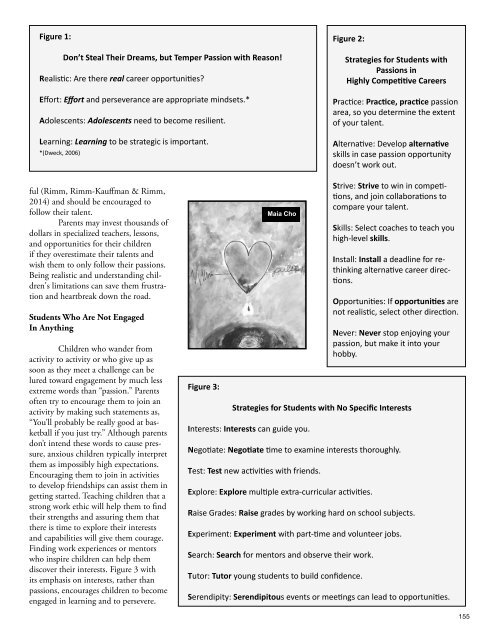Torrance Journal for Applied Creativity
TorranceJournal_V1
TorranceJournal_V1
Create successful ePaper yourself
Turn your PDF publications into a flip-book with our unique Google optimized e-Paper software.
Figure 1:<br />
Don’t Steal Their Dreams, but Temper Passion with Reason!<br />
Realistic: Are there real career opportunities?<br />
Ef<strong>for</strong>t: Ef<strong>for</strong>t and perseverance are appropriate mindsets.*<br />
Adolescents: Adolescents need to become resilient.<br />
Learning: Learning to be strategic is important.<br />
*(Dweck, 2006)<br />
Figure 2:<br />
Strategies <strong>for</strong> Students with<br />
Passions in<br />
Highly Competitive Careers<br />
Practice: Practice, practice passion<br />
area, so you determine the extent<br />
of your talent.<br />
Alternative: Develop alternative<br />
skills in case passion opportunity<br />
doesn’t work out.<br />
ful (Rimm, Rimm-Kauffman & Rimm,<br />
2014) and should be encouraged to<br />
follow their talent.<br />
Parents may invest thousands of<br />
dollars in specialized teachers, lessons,<br />
and opportunities <strong>for</strong> their children<br />
if they overestimate their talents and<br />
wish them to only follow their passions.<br />
Being realistic and understanding children's<br />
limitations can save them frustration<br />
and heartbreak down the road.<br />
Students Who Are Not Engaged<br />
In Anything<br />
Children who wander from<br />
activity to activity or who give up as<br />
soon as they meet a challenge can be<br />
lured toward engagement by much less<br />
extreme words than “passion.” Parents<br />
often try to encourage them to join an<br />
activity by making such statements as,<br />
“You’ll probably be really good at basketball<br />
if you just try.” Although parents<br />
don’t intend these words to cause pressure,<br />
anxious children typically interpret<br />
them as impossibly high expectations.<br />
Encouraging them to join in activities<br />
to develop friendships can assist them in<br />
getting started. Teaching children that a<br />
strong work ethic will help them to find<br />
their strengths and assuring them that<br />
there is time to explore their interests<br />
and capabilities will give them courage.<br />
Finding work experiences or mentors<br />
who inspire children can help them<br />
discover their interests. Figure 3 with<br />
its emphasis on interests, rather than<br />
passions, encourages children to become<br />
engaged in learning and to persevere.<br />
Figure 3:<br />
Maia Cho<br />
Strive: Strive to win in competitions,<br />
and join collaborations to<br />
compare your talent.<br />
Skills: Select coaches to teach you<br />
high-level skills.<br />
Install: Install a deadline <strong>for</strong> rethinking<br />
alternative career directions.<br />
Opportunities: If opportunities are<br />
not realistic, select other direction.<br />
Never: Never stop enjoying your<br />
passion, but make it into your<br />
hobby.<br />
Strategies <strong>for</strong> Students with No Specific Interests<br />
Interests: Interests can guide you.<br />
Negotiate: Negotiate time to examine interests thoroughly.<br />
Test: Test new activities with friends.<br />
Explore: Explore multiple extra-curricular activities.<br />
Raise Grades: Raise grades by working hard on school subjects.<br />
Experiment: Experiment with part-time and volunteer jobs.<br />
Search: Search <strong>for</strong> mentors and observe their work.<br />
Tutor: Tutor young students to build confidence.<br />
Serendipity: Serendipitous events or meetings can lead to opportunities.<br />
155


